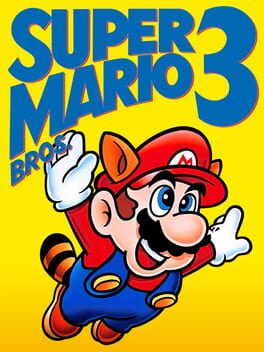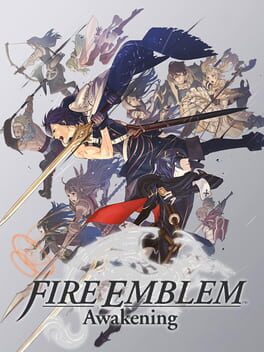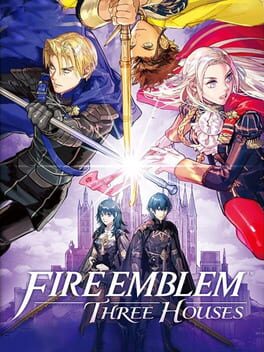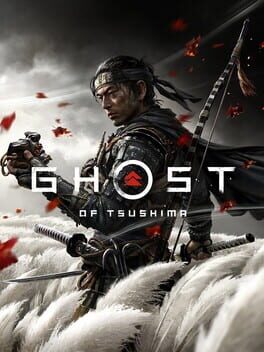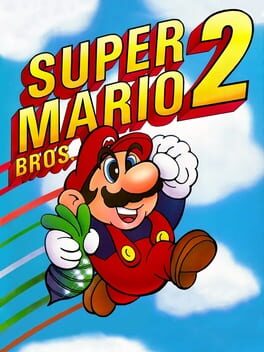MattGoldberg
Bio
The only thing more fun than video games is cataloging them!
The only thing more fun than video games is cataloging them!
Badges

Liked
Gained 10+ total review likes

3 Years of Service
Being part of the Backloggd community for 3 years
Favorite Games
011
Total Games Played
000
Played in 2024
000
Games Backloggd
Recently Played See More
Recently Reviewed See More
This review contains spoilers
Tonight I finally beat Fire Emblem: Three Houses. I bought the game when it first came out in July 2019, but for whatever reason, I only got less than halfway through before I decided to put it down and move on to something else. I tried picking it up again where I left off, but had forgotten too much of the story. Then I decided to simply start a new game playing with the same house (Blue Lions), but swapped the genders on Byleth from male to female.
Overall, I still love what Fire Emblem is putting down, and the school conceit was way better than whatever the series was trying to do with the disappointing Fire Emblem: Fates. Making the protagonist a professor and your fighters your students creates a much stronger emotional bond, and I wanted to ensure that my main group thrived and excelled as the game went along. However, the overall story, at least from the Blue Lions side, feels like it’s missing a third part. The five-year time jump, while overly choreographed, was a smart move, but it feels like there’s supposed to be a little more after the war. What happened with all the spooky magic people? The conclusion of Lady Rhea’s arc is incredibly anti-climactic. It feels like there was a bit more story to tell, but the epilogue rushed it, and when you’ve dumped 50 hours into a game, the last thing you want is a brief conclusion. Let me feel like I’ve earned the finale.
The question now becomes if I want to play through the other two stories, and I’m not feeling great about that. For starters, it’s not like Fire Emblem: Awakening, where I couldn’t get enough of the game. I liked Three Houses a good deal, but its world does feel somewhat limited. The upside of a new play through is that I’d get to hang out with new characters and go through a different storyline. However, there are two downsides to this. First, to get to the different storyline, you have to grind a bit through the stuff where you know everything is going to be the same. Second, and more difficult, is that [spoilers!] you’ll probably have to redo the Battle of Gronder Field, which means killing the characters you grew to love on your previous play session. I’m attached to these weirdoes now! I don’t want to kill Ashe or Dedue! And I’m sure that’s kind of the point: we wouldn’t do wars if we saw our enemies as individuals rather than combatants; but from a play perspective, I’m not all that eager to start as the Golden Deer House only to kill my former students in the Blue Lions House. I’ve read that in New Game+ you can recruit your former students more easily, but we’re still left with the first problem.
Currently, I’m settling on the solution that I’ll set Three Houses aside for a bit and maybe in a year’s time I’ll come back to it, start up a New Game+ and play through as a different house. But for now, I think Fire Emblem: Three Houses will be the last video game I play in 2020.
Overall, I still love what Fire Emblem is putting down, and the school conceit was way better than whatever the series was trying to do with the disappointing Fire Emblem: Fates. Making the protagonist a professor and your fighters your students creates a much stronger emotional bond, and I wanted to ensure that my main group thrived and excelled as the game went along. However, the overall story, at least from the Blue Lions side, feels like it’s missing a third part. The five-year time jump, while overly choreographed, was a smart move, but it feels like there’s supposed to be a little more after the war. What happened with all the spooky magic people? The conclusion of Lady Rhea’s arc is incredibly anti-climactic. It feels like there was a bit more story to tell, but the epilogue rushed it, and when you’ve dumped 50 hours into a game, the last thing you want is a brief conclusion. Let me feel like I’ve earned the finale.
The question now becomes if I want to play through the other two stories, and I’m not feeling great about that. For starters, it’s not like Fire Emblem: Awakening, where I couldn’t get enough of the game. I liked Three Houses a good deal, but its world does feel somewhat limited. The upside of a new play through is that I’d get to hang out with new characters and go through a different storyline. However, there are two downsides to this. First, to get to the different storyline, you have to grind a bit through the stuff where you know everything is going to be the same. Second, and more difficult, is that [spoilers!] you’ll probably have to redo the Battle of Gronder Field, which means killing the characters you grew to love on your previous play session. I’m attached to these weirdoes now! I don’t want to kill Ashe or Dedue! And I’m sure that’s kind of the point: we wouldn’t do wars if we saw our enemies as individuals rather than combatants; but from a play perspective, I’m not all that eager to start as the Golden Deer House only to kill my former students in the Blue Lions House. I’ve read that in New Game+ you can recruit your former students more easily, but we’re still left with the first problem.
Currently, I’m settling on the solution that I’ll set Three Houses aside for a bit and maybe in a year’s time I’ll come back to it, start up a New Game+ and play through as a different house. But for now, I think Fire Emblem: Three Houses will be the last video game I play in 2020.
Ghost of Tsushima is kind of the best and worst that an open-world game has to offer. While playing it, I realized I had sold a game like Red Dead Redemption 2 a little short because for all of its storytelling defects, it at least endeavored to fill its canvas with rich, interesting characters and colorful side-quests. Ghost of Tsushima doesn’t really do anything interesting narratively until the third act, and most of its side-quests amount to little more than “Go here, kill Mongols.” Every time the game has the opportunity to do something interesting, it reverts to “Go here, kill Mongols.”
To be fair, there’s something oddly comforting in its errand simulator. Some dopamine gets triggered when you clear a map or unlock a trophy. The game is never punishingly difficult, and the combat mostly feels fair–a light challenge while never making you feel like you have to work at becoming good at a video game. And given its lush environments, there’s something soothing about traversing the map to go compose a haiku to get a new headband or sit in a hot spring to increase your maximum health.
But by the end of the game, I was frequently wondering, “Is this it?” Rather than luring me in to play just a little bit more, I found myself a little worn out and taking myself away from Ghost of Tsushima, partly out of boredom and partly out of repetition. I knew the next side-quest would be fairly uninteresting (go here, kill Mongols) and undemanding. I was never mad at the game as much as I was largely indifferent towards it. I don’t necessarily mind when a game gets a little repetitive (there are only so many gameplay systems you can build in and have them all work properly), but there needs to be the character and story to back it up like in PS4’s Spider-Man.
When I unlocked the final trophy in Ghost of Tsushima, I didn’t feel accomplished as much as I was glad that I could put the game away. I appreciate the three weeks of playtime I got out of it, but more often than not, it was a visually lush experience that ultimately felt a little shallow.
To be fair, there’s something oddly comforting in its errand simulator. Some dopamine gets triggered when you clear a map or unlock a trophy. The game is never punishingly difficult, and the combat mostly feels fair–a light challenge while never making you feel like you have to work at becoming good at a video game. And given its lush environments, there’s something soothing about traversing the map to go compose a haiku to get a new headband or sit in a hot spring to increase your maximum health.
But by the end of the game, I was frequently wondering, “Is this it?” Rather than luring me in to play just a little bit more, I found myself a little worn out and taking myself away from Ghost of Tsushima, partly out of boredom and partly out of repetition. I knew the next side-quest would be fairly uninteresting (go here, kill Mongols) and undemanding. I was never mad at the game as much as I was largely indifferent towards it. I don’t necessarily mind when a game gets a little repetitive (there are only so many gameplay systems you can build in and have them all work properly), but there needs to be the character and story to back it up like in PS4’s Spider-Man.
When I unlocked the final trophy in Ghost of Tsushima, I didn’t feel accomplished as much as I was glad that I could put the game away. I appreciate the three weeks of playtime I got out of it, but more often than not, it was a visually lush experience that ultimately felt a little shallow.
I did not have a Nintendo Entertainment System (NES) growing up. The first console we ever got in my house was a Super Nintendo, which we loved very much (thanks, Mom!). But that didn’t stop me from playing NES games over at friends’ houses. However, one game I never really got to play was The Legend of Zelda, which makes sense. While the Super Mario Bros. games allow for multiple players or you can switch off lives and levels, Zelda is a big, expansive game of trial-and-error. It’s a game the begs you to get lost in it, to dig out some graph paper, and to record the location of every secret treasure. It’s a game that demands you get together with your friends who are also playing it and figure out the location of the secret rooms and how to get into various dungeons. Before social networking became a thing, the social element of Zelda was essential (it was either that or pick up a strategy guide).
As a kid, I can imagine that playing The Legend of Zelda was a blast, but I am now an adult. The game is part of the NES Classics lineup on Nintendo Switch, so I decided to finally play through it. However, since my free time is more finite and all my friends aren’t playing a game from 1986, I decided to take a couple shortcuts. First up, I happily used an online strategy guide to help direct me in making my way around Hyrule. Second, and what I’m sure others will declare as blasphemous, I made use of the rewind feature when enemies started raining a beatdown on me. I regret nothing. I wanted to play the game, but I also realized that there was no way in 2019 for me to play it as originally intended unless I forsook other responsibilities like “spending time with my wife” and “my job.”
And having beaten the game (or at least the first quest; I don’t really see the point of completing the second quest), it’s no surprise why the game is a classic. I actually felt a little sad that I didn’t get to play this game when it came out because I can easily see getting lost in making maps and talking about how to beat dungeons with friends. That’s the communal aspect of video games that’s kind of lost right now and has kind of wandered over to “solving” TV shows like Lost and Westworld. Now the community of video games is who can you beat and how badly you can beat them rather than a small group of young friends coming together to get to the end of a quest. As an adult, I’m no longer the target audience for a 34-year-old video game, if that game has any large audience at all. But I’m grateful for the experience of having played it, shortcuts and all.
As a kid, I can imagine that playing The Legend of Zelda was a blast, but I am now an adult. The game is part of the NES Classics lineup on Nintendo Switch, so I decided to finally play through it. However, since my free time is more finite and all my friends aren’t playing a game from 1986, I decided to take a couple shortcuts. First up, I happily used an online strategy guide to help direct me in making my way around Hyrule. Second, and what I’m sure others will declare as blasphemous, I made use of the rewind feature when enemies started raining a beatdown on me. I regret nothing. I wanted to play the game, but I also realized that there was no way in 2019 for me to play it as originally intended unless I forsook other responsibilities like “spending time with my wife” and “my job.”
And having beaten the game (or at least the first quest; I don’t really see the point of completing the second quest), it’s no surprise why the game is a classic. I actually felt a little sad that I didn’t get to play this game when it came out because I can easily see getting lost in making maps and talking about how to beat dungeons with friends. That’s the communal aspect of video games that’s kind of lost right now and has kind of wandered over to “solving” TV shows like Lost and Westworld. Now the community of video games is who can you beat and how badly you can beat them rather than a small group of young friends coming together to get to the end of a quest. As an adult, I’m no longer the target audience for a 34-year-old video game, if that game has any large audience at all. But I’m grateful for the experience of having played it, shortcuts and all.
